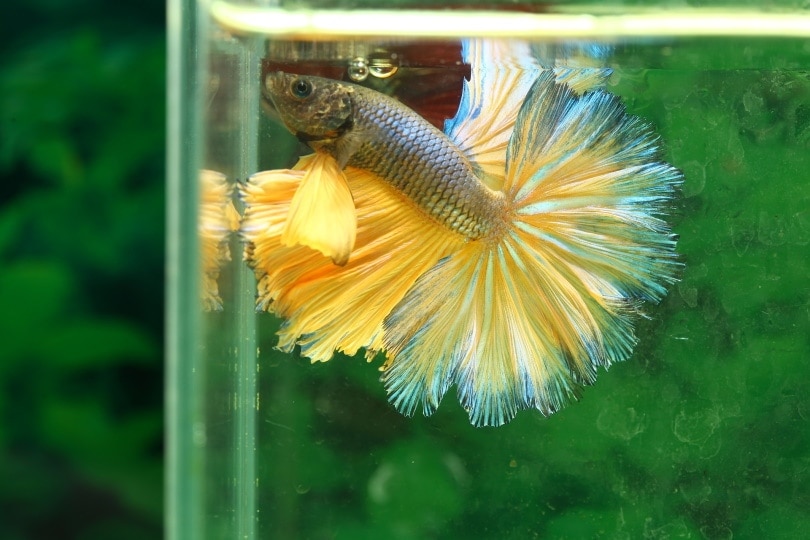How Long Can a Betta Fish Live out of Water? Vet-Approved Facts

Updated on

The expression, “a fish out of water,” is an accurate one. It describes an animal or person that is out of their comfort zone, with the possibility of dire consequences or even death. However, if you have an aquarium, you have probably faced this situation in a literal sense. Maybe you don’t have a hood on your tank, or someone left the lid open after feeding your fish. You eventually discover an unwelcome sight: a dried-up fish on the floor next to your aquarium.
Jumping is something that many fish do, even in the wild. Think of flying carp or salmon swimming upstream during spawning. It’s common with tropical fish too, such as swordtails, gobies, and hatchet fish. Jumping isn’t necessarily a unique talent, it’s an instinctive action. Of course, some species can do it better than others, usually as a function of their body structure. Often, older fish are better at it simply because they’re more mature and their bodies are more well-developed.
Why Fish Jump
If you can figure out what may prompt your Betta fish to jump out of the water, you can find ways to prevent it. Jumping serves an evolutionary purpose integral to survival. You may observe shiners and minnows becoming airborne if a predator is circling under the water. Anglers use this action to their advantage.
Spawning salmon jump to get around obstacles, which in their case, is rushing water and waterfalls. They can go up to 4 feet above the surface. Sometimes, fish take to the air to catch prey, such as the Southern Saratoga1.
Other times, many fish will jump because something scared them enough to prompt them to try to evade the danger. That can explain why fish on the end of a fishing line will flop around to try to dislodge the hook in their mouths. Sometimes, it works and they can throw off the lure.
All these things make sense because they factor into survival. Other reasons may seem less obvious. Some research suggests that fish may jump to rid themselves of parasites. The hypothesis is that the action of going in and out of the water will scrape off sea lice. Circumstantial evidence shows that infested salmon are more likely to get airborne, adding credence to the theory.
But the most likely reason that Betta fish and other species can jump out of the water is simply because they can.

Being a Labyrinth Fish
Betta Fish are labyrinth fish. That means they can swim to the surface and breathe atmospheric oxygen in addition to breathing via their gills in the water. They have a supplemental respiratory organ that makes it possible. That also means that Bettas are comfortable hanging around near the surface of the water.
The water in which Bettas live must contain at least 5 ppm2 dissolved oxygen for them to survive. Anything lower won’t support aquatic life. However, the labyrinth organ makes Bettas one of the best fish at tolerating lower water oxygen levels. In the wild, Bettas are found in stagnant rice paddies in tropical environments. The ability to breathe directly from the surface of the surface of the water compensates for the low dissolved oxygen in the water itself.
The main reason betta fish jump out of their water is because they often associate a small gap on the lid as “places where food comes from” whenever they observe you feeding them. Therefore, if the lid is ever left unattended and open, they might think it’s meal time and might jump for food, landing out of the water.

Survival Outside of Water
Betta fish have an instinctive ability that gives them a chance to survive on the floor. Not all fish are as lucky on this score. Bettas can breathe atmospheric oxygen as long as their membranes remain moist. It facilitates gas exchange. Otherwise, there’s a problem.
While Betta fish can survive for a brief time outside their tank, this period is short-lived and typically sets the clock ticking until 1-2 hours. Several factors will affect their survivability, particularly the humidity and ambient temperature. The drier it is, the faster the clock ticks down. The warmer it is, the more active the fish is, which can accelerate the timeline to its inevitable end.
Hypothetically, bettas can survive longer than 2 hours outside water if they were in a very humid environment. However, for ethical reasons, it’s not recommended to test this out on your fish. It’s also important to note that while bettas can survive for a short period of time outside water, they often get injured from the jump itself (because they land on solid ground and not water). Therefore, it’s very important to house them in a covered aquarium with a secure lid.
Final Thoughts
Betta fish are extremely tolerant to less-than-ideal conditions. They can handle low oxygen levels because of their ability to breathe atmospheric oxygen. In the wild, they live in shallow waters, such as rice paddies, marshes, and ponds. That gives them an edge for survival. However, all fish are vulnerable when out of the water. The most that your betta fish can live outside their tank is probably less than 2 hours.
Looking for more information on betta fish? Try:
- How Smart Are Betta Fish? The Answer Might Surprise You!
- Betta Fish Popeye: Causes, Treatment & Prevention
Featured Image Credit to: NattapolStudiO, Shutterstock












